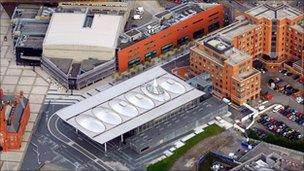Q&A guide to the Welsh assembly powers referendum
- Published

Should the assembly have more law-making power? You decide
Voters in Wales go to the polls on Thursday to decide whether the Welsh assembly should have more law-making powers. The campaign has included debates about legislation, rows about the use of public funding and a giant inflatable pig. With one day left for people to make up their minds about the devolution settlement, BBC Wales political reporter Daniel Davies explains what the referendum is all about.
What is the referendum for?
Strictly speaking, the referendum asks voters to decide whether the assembly should progress to part four of the 2006 Government of Wales Act - the act that sets out the extent of the assembly's powers.
At present, made-in-Wales laws can be passed in Cardiff Bay, but only after law-making powers have been obtained from Westminster.
Those powers are transferred from parliament to the assembly on a case-by-case basis through a system called legislative competence orders (LCO).
For example, AMs, MPs and the UK government are currently mulling over a law-making request about organ donation. The Labour-Plaid coalition wants the assembly to have the necessary powers to introduce presumed consent, but it first needs to seek parliament's agreement through an LCO.
A Yes vote would scrap LCOs and let the assembly pass primary legislation in the 20 devolved policy fields - such as health, education and transport - without having to seek parliament's consent.
No campaigners say the LCO system gives Welsh MPs a say in law-making in devolved areas, but Yes campaigners say changing the system would speed up government and save money.
Why is there a referendum on Thursday?
Put simply, because the assembly wants one. Cynics may not be surprised to learn that a group of politicians are in favour of a referendum to make them more powerful. However, Yes campaigners argue that this is less about empowering politicians and more to do with improving the way Wales is governed.
The move towards a referendum began in 2007 after that year's inconclusive assembly election.
Labour and Plaid Cymru broke the deadlock with their One Wales coalition deal. One of the agreement's pledges, perhaps the most striking, was to hold a referendum on furthering the assembly's powers if there was sufficient public support.
The two parties' assembly government set up the All Wales Convention to probe the mood of the country towards devolution.
In November 2009 the convention, reflecting the findings of opinion polls, concluded that a Yes vote in favour of boosting the assembly's powers was obtainable but not guaranteed.
That verdict was the green light that ministers sought. They tabled a call for a referendum which AMs unanimously endorsed in a Senedd vote in February last year.
Who has been campaigning?
The Yes for Wales campaign has the support of the leaders of the four main political parties in Cardiff Bay. It is chaired by Roger Lewis, chief executive of the Welsh Rugby Union. The most prominent No group is True Wales, which describes itself as a grassroots organisation. Its main spokesperson is Rachel Banner, a Labour Party member and school teacher.
Neither side has been allowed to use public funding. A decision by True Wales not to seek official lead campaign status effectively deprived their opponents of the same privilege.
Does a Yes vote mean more AMs?
No. The referendum is solely about part four of the Act, which says nothing about adding to the existing 60 AMs.
Will it give the assembly the same powers as the Scottish parliament?
Another no. The assembly will continue to have control over the existing 20 devolved subject areas. It may have more power in those areas, but it will not be able to stray into new terrain.
A Yes vote would not allow Welsh minister to change the criminal justice system or repeal fox hunting, for example.
And the assembly still won't be able to levy taxes.
How do I vote?
In the same way as an election. You must be 18 or over to take part.
Polling hours are 0700 to 2200 GMT. Counting will start at 0930 GMT Friday, with results from the 22 local authorities collated at a central count in the Senedd, Cardiff Bay.
The Electoral Commission has distributed a booklet on the referendum as part of its statutory duty to run a public information campaign.